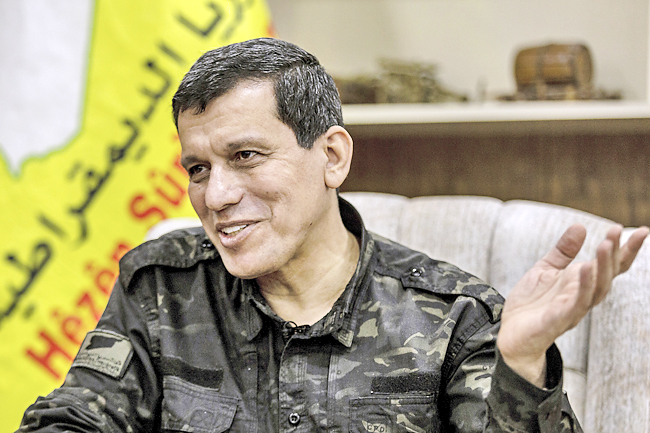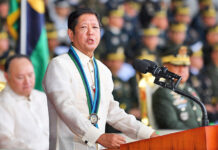HASSAKEH, SYRIA (AP) – The Islamic State (IS) group is a growing threat in northeastern Syria despite the killing of its leader in a United States (US) commando operation last week, said the chief commander of the US-allied Syrian Kurdish-led force.
Mazloum Abdi (AP; pic below), who heads the US-backed Syrian Democratic Forces (SDF), warned that IS fighters are still very much present in the wake of a deadly attack by the militants on a Syrian prison last month. That attack killed 121 fighters from the Syrian Kurdish-led force, he added.
“We are surrounded by the Islamic State,” Abdi said in a wide-ranging interview with The Associated Press on Thursday night. “We have said this many times. If we don’t strive to fight IS now, they will spread again.”
A tenuous calm has prevailed in the region since IS’s spectacular January 20 attack on Gweiran Prison, or al-Sinaa – a Kurdish-run facility in Syria’s northeast where over 3,000 IS militants and young boys, mainly sons of IS fighters, were held.
The attack on the prison led to 10 days of fighting between US-backed Syrian Kurdish fighters and IS militants that left nearly 500 dead on both sides until the SDF brought the situation under control eventually.
Abdi said immediate security measures were taken to contain IS sleeper cells after the assault: faulty detention centres prone to similar attacks have been emptied, security sweeps are ongoing and curfews limit night-time movements. But, the threat remains,
he warned.

The SDF assisted in the US operation that killed IS leader Abu Ibrahim al-Qurayshi in the northwestern Idlib region last week by facilitating passage and logistics for the US but did not participate with fighters on the ground.
“We provided safety and security for personnel who went in, that’s all I can say,” he said.
While IS morale may have taken a hit with al-Qurayshi’s death, Abdi said he did not believe it would lead to the group’s decline.
He said he shared blame for the prison attack – the biggest and bloodiest since IS lost the last sliver of territory it held in Syria in 2019, marking the end of its self-declared “caliphate” over large parts of Syria and Iraq. “We didn’t execute our responsibilities well,” Abdi said.
His fighters last year twice got intelligence that IS sleeper cells were planning to attack the prison, located in Hassakeh province, to free their comrades inside. One attack was even thwarted.
“There was intelligence before that they wanted to attack, and we took procedures, but then we failed,” he said.
But he also blamed the international community, which he said should assume responsibility for the thousands of foreign IS fighters held in prisons and camps overseen by the Syrian Kurdish-led forces.
Abdo said searches are now underway in 27 detention facilities housing IS detainees to identify security weaknesses.



















































